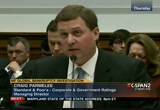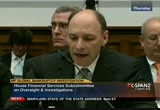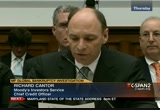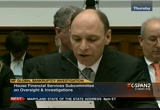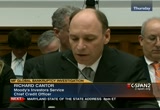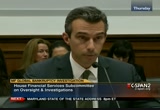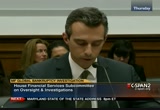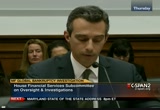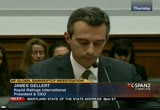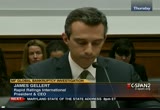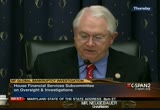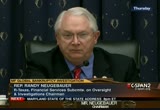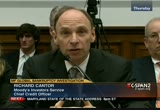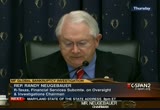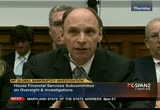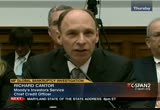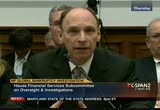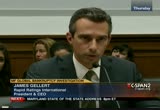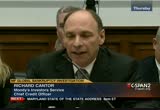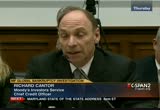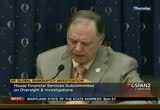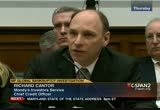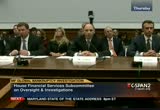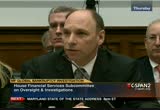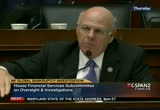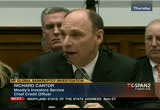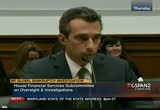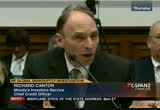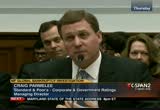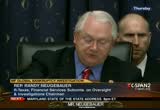tv Close Up CSPAN February 3, 2012 7:00pm-8:00pm EST
7:00 pm
>> mr. chairman members of the subcommittee, good morning. my name is richard cantore. i've lead a credit policy group and they share the credit policy committee which are dryly responsible for the review and approval of moody's rating methodology. thank you for this opportunity to address you today. long before the collapse of mf global you that was particularly reliant on customers and other party confidence. r rating reflected our view that mf global credit profile has speculative characteristics compared to other reading credits. in fact several years moody spewed mf global is one of the risk is credits among all u.s. banks and securities firms. today i will describe the rating
7:01 pm
action moody stood before am a globals bankruptcy which was brought on by the revelation the customer assets were missing. but first would be helpful to briefly explain the meaning of moody's credit rating and the indicators we use to communicate to the market the possible direction of those ratings. moody's credit ratings are forward-looking opinions that speak to relative credit risk on a multiple step scale. this means the issuers assigned a higher reading level that are less likely due to the fault and issue to design a lower level. some credits are expected to deval that every reading level. no one can predict with specific credit and a particular level will befall. if that were possible movies with simply use a two-step rating scale to fall or not to fall. moody's expresses its opinions in the market not only through his ratings but also through the public directional trading indicators called rating outlooks and reading reviews and
7:02 pm
through written research. when we announced the credit rating, we are indicating issuers reading are more likely to be downgraded and upgraded over time placing of reading on review indicates the rating is likely to change over the near-term. by 2008, moody spewed mf globals creditworthiness is not particularly strong as reflected and its negative outlook. moody's subsequently downgraded ammo globals credit rating. by the end of 2010, the rating had a negative outlook. again communicating downward pressure on grading. moody's reassess the credit profile last february night of the company's continued weak profitability and high leverage relative to similarly rated peers. way wafer and way from the nick at outlook and issued a press release identifying three areas of concern about the company's performance earnings leverage and risk. which would determine the next
7:03 pm
rating action over the following 46 words. two quarters later in august of last year moody's communicated it would likely down great mf global as the companies forman did not improve in this area. on october 21 moody's analysts will met with mr. corzine and members of his team in advance of the announcement of its quarterly financial that feldman. during that meeting mr. corzine made clear it repurchased the transparent actions were proprietary trading provisions. prior to that meeting moody's understood that the company was increasing its principle trading activities primarily for the purpose of facilitating customer transactions. and mf global also revealed to moody's it reported significant quarterly loss. as a result moody's, mf globals performance deteriorated and three areas of concern that moody's identified last february. earnings leverage and risk.
7:04 pm
on the very next business day moody's downgraded ammo globals reading this time to placing it on review for further possible downgrade. the following day and a global announced a record quarterly loss and it's accelerating customers and powder parties rapidly tickle. this gathered pace of the subsequent 48 hours and moody's downgraded its rating and kept the credit on review for further possible downgrade. when mf global file for bankruptcy on october 31 moody's downgraded its credit rating to see aa one. thank you and i look forward to answering your questions. >> it thank the gentleman. mr. gilbert -- gillard you are recognized. >> employee shareholders and subscribers i would like to thank german nuegebauer, ranking member capuano members for asking me to testify today. i am james gellert.
7:05 pm
as is clear by now mf global is a tragic story for wall street, main street in the futures industry. its bankruptcy follows trends with other notable failures in the last 12 years in one way. agencies that repay to provide professional opinions on credit risk bill to give sufficient warning of this firms risk. mf global investment grade ratings from standard & poor's from 2007 until october 31, 2001 and for moody's and fitch from 2007 until october 24, 2011. and contrast renderings provided two years of warnings at mf global is a high risk. we are a user paid non-issuer paid firm. financial statements no market inputs, no qualitative analysts and we have no content for the ratings process with management, bankers and investors or their advisers. we utilize a proprietary software-based system to raise
7:06 pm
private companies quarterly. ratings have an impressive record is outperforming the three rating agencies. shr financial health rating system evaluates 62 ratios from companies income statements and balance sheets. the product of a highly complex modeling process it measures variations in the financial health of any company effectively benchmarking how well it is able to withstand internal or external shot. we are consistent, we are accurate. over the past one years approximately 90% of the faults have occurred at 40 and below on our schedule. bankruptcy we had mf global rated at 23. both ratings are in in the high-risk category in well below investment grade where we have had them for over two years. these ratings are the rough equivalent of trouble c-and ccc on the alpha scale or eight to 10 ratings not just below where they sat for three agencies. the shr system is agnostic to quality judgment, qualitative judgment like management star power unless their actions
7:07 pm
affect the company's financial help. at mf global is a simple story of a firm's declining performance in 2007 in various measures including revenue performance, rough at ability and service management and others. from 2007 through 2011 mf global revenue declined by 63% from 6.1 billion to 2.2 billion profit declined by 142% from 190,000,002 negative 79. the last 16 quarters of mf global reported losses and the last four saw losses grow by 68% over the prior 12 months. its most recent quarterly report showed a record loss of 191.6 million. without factoring risky trading and euro sovereign debt and other things and that global was unmistakably in declining health number one the issuer paid business model is inherently conflicted make in its objectivity difficult to administer consistently.
7:08 pm
management of reading companies will try hard to get and keep the best possible ratings. their ratings are better than none. trading analyst don't properly question what they are sold and ratings can be compromised. this drive for stable ratings look through the cycle thus ignoring the short to medium-term performance volatility that can capture firms underlying fundamentals and determine long-term success or failure. three, barriers to competition are still great despite reform efforts and our sro ratings are firmly embedded all over the system. four and finally the big three holds little to no accountability when things go wrong. him if global story inevitably turned to the question of timing of ratings changes traditional agencies that need to be careful in downgrading a company because they can affect market behavior. they also rightly assert many investors watch reading stability. they pale in comparison to the damage done when ratings are downgraded too late or not at all.
7:09 pm
we do not advocate ratings volatility that we support a better ratings industry. congressman fitzpatrick's recent draft bill in response to these points dreck lee. require. required are an sros to stand by ratings and a quarterly basis. the market is the way of knowing when the big three are proactive behind schedule or simply inattentive. while we regularly outperform the big three we don't believe the rapid ratings system is simply better than others nor traditional ratings are always flawed. we believe in open competition in the ratings business so institutional investors risk professionals and regulators can choose among operators. certainly those who had early warnings were far better served and those who relied exclusively in the big three whose ratings provided none. it's time to require more timely ratings more accurate ratings and more competition. and not simply rely on traditional agencies only to deliver in defend much less. thank you. >> i thank the gentleman and now
7:10 pm
we will go to questions by the panel and the chair recognizes himself for five minutes. mr. kantor in the moody's january 17 letter responding to the subcommittee, with reference to the rtm trades, they said the analyst did not have an understanding that mf global was exposing its own capital in amounts representing a multiple of its outstanding common equity until october 21 of 2010 but in fact the 10-k followed by mf global for the period ending march 31 that was published on may 20, 2011 mf global disclosed those positions in their 10-k but yet movies didn't know about it at least according to your
7:11 pm
firm's letter until october 21, 2011. how do you explain that? >> well, of course all financial services are exposing their capital at multiple levels with the assets they hold on balance sheets, what they have ever eyed iterative exposures and also can be viewed as exposing your capital to multiple so the entirety of the obligations which the financial service firms enter into will become significant multiple other than capital. in this particular case we were talking about a specific set of transactions which we had interpreted based on our discussion with management in the past as being transactions that had undertaken with the intention to facilitate customer base transactions which would imply that either they were being liquidated over a short
7:12 pm
period of time than those customer transactions have been in place or they were being hedged or being used for other purposes rather than taking strictly proprietary trading position. >> i think we understood that was your response but we talked to some other people that looked at that 10-k and based on bringing mr. corzine and and mr. corzine's stated -- for this company that they were moving you know, or adding to, adding proprietary trading becoming a full-service investment banking company. and so a lot of folks think that either if you didn't understand that you should have followed it up but then i am sure you are aware in august they filed a 10-q and basically your analysts
7:13 pm
reviewed the 10-q filed and not as. >> i'm not aware that filing was reviewed. you are talking about the 10-q or the 10-q a? >> well they did a 10-q in september which detailed 150 million-dollar finra capital charge which was related to the european rtm trades. >> that was a one-page document. that was not as far as i know reviewed by the analyst at that time. >> but would that have been a flag to the analyst in your firm to say do you know what, what's up with this? we should go back and take a look at this. >> i don't believe so. i believe what that document indicated was the cash capital that was being required by mf globals regulator was being increased because the different interpretation that was being given to the exposure.
7:14 pm
it wasn't new information about the exposure but rather capital and the magnitude of the changing capital requirements would not be particularly a significant amount from a credit respect. >> future analysts read the financial newspapers? >> as. >> "the wall street journal" had an article on october 17 of 2011 that detailed that they have been asked to put up additional capital, that there was concern about the company. did your analysts analyst analysts follow up on that? >> yes. we had a meeting already scheduled with mf global and that topic would be discussed. >> what was the date of that meeting? >> the date of the meeting was the 21st i think and there was
7:15 pm
prior discussion two days before that. >> four days after "the wall street journal" so you all did not pick it up in the initial 10-k that came out in march and subsequent 10-k's they came out you became aware that they had been asked to take additional capital so did you read "the wall street journal" and decide maybe we should go over to mf global and see what is going on? >> no. this is in the context other regularly quarterly meeting that we had with mf global and other major issuers in the market and we would be reviewing in that meeting all the financial releases that had have occurred in the interim since the previous meeting and we would be discussing that issue as well as others. if you recall, there was not a lack of knowledge of the european exposure but rather a
7:16 pm
difference in view about what that exposure entailed and how to interpret that exposure which was not discussed either of the documents you mentioned. >> well, obviously s&p was able to figure that out earlier i guess then moody's did. they would be concerned about the company's capital for some time. mr. gellert i was going to ask you the reading was 23? >> was 29 going into october and at the quarterly financial reese -- release we downgraded a. >> that is on a scale from what? >> zero to 100. >> zero to 100. >> it's not very good. 26 is the point on our curve for the last 20 years individual defaults have occurred so anything in the 23, 26, 29 range
7:17 pm
is definitely a cause for significant concern. >> i yield to mr. -- for five minutes. >> mr. parmelee would you agree or disagree that a bbb reading from your agencies was not a good reading? via our reading was bbb minus. spi know what it is. would you agree it's not a very good reading? >> is in the middle of our scale. >> would you invest with somebody doing investment with a bbb reading with your personal money? >> sir, is it considered to be an investment rating but it's her lois grade level and that is the point i was making. >> mr. cantor, you're reading, pretty low? >> there is no reading that is a good reading or a bad reading. we have a lot of issuing. >> having received ratings in the past, almost irrespective
7:18 pm
lee i would disagree. when you get that rating you'd want a good one. we know the difference between a fpaa and it abe, you don't? >> by a meet with issuers regularly and some of them are extremely pleased and investors are pleased at their bonds are upgraded. >> so you're telling me a ratings don't mean a thing? >> there is a trillion dollar junk on market. there's a trillion dollar rape unissued. >> doesn't matter what reading you rate them? in why bother? i want to go down this path. you can avoid the questions up to a point. i will catch you in a minute. i want to follow up on the chairman's question. mr. cantor, you stated in your written document that you didn't know that they were doing proprietary trading until october 21 of 2011? do you know what that tells us?
7:19 pm
very simply nobody at the firm read the 10-k. is that a fair conclusion, he did not read the 185 page document in may of 2011? >> that document was read. >> but you miss the fact that there was proprietary? >> we did not understand. >> so it was unclear. >> we didn't understand that the size of the position was proprietary. >> the statement is you didn't know it was the first time you had learned it. i want to go down the road of these -- mr. parmelee you stated that 10-k was the first time you learned of of the off-balance-sheet ibm. is that a correct statement? >> i did not haven't noticed. >> mr. parmelee did you know about the off-balance ibm? >> i learned about the off-balance-sheet rtm later on.
7:20 pm
the team was aware. i didn't learn about those until probably the october timeframe. >> mr. cantor did your company know about the off-balance-sheet rtm? >> yes. >> so you did read the 10-k? >> i said yes before. >> it's kind of interesting if you are getting a lot of money to read something you think you would actually read it. i guess the reason i'm asking this is because honestly the off-balance-sheet thing bothers me to no end in the fact that neither of you could have possibly known. let me ask a quick session mr. cantor, did you know about the rtm before the off-balance-sheet? >> no. >> so there is no way you could have known it which i understand that is why they call it in off-balance-sheet. the problem that i have as i understand it, allowing these off-balance-sheet rtm's is perfectly okay according to accounting rules. am i understanding correctly?
7:21 pm
do you agree that my understanding is correct? >> i believe so. >> let me ask you a question, the reason for the off-balance-sheet is for some reason -- fails which for all intensive purposes and i don't understand when you have these rtm's that they are not recorded as a wash. in this particular case it turns out maybe they were a liability. but at least a wash. if the accounting rules required them to be put on earlier statements do you think it would have affected your ratings earlier mr. parmelee? >> no, sir. we were aware, i'm sorry after was made public in may so we were aware of the rtm portfolio. are analysts read the financial statement as part of our procedure. they did in this case and they told me they did. we believe that all the information around that
7:22 pm
portfolio was factored into our reading and we called the portfolio so. >> when he first learned of a multibillion-dollar off-balance-sheet risky investment they wouldn't change her opinion at all? >> it is and whether not it's in off-balance-sheet but what is in the investment itself and how much risk does it pose? our valuation of the risk was it was made up of five european sovereign bonds. those tended to be very highly rated european sovereigns. 80% of the exposure. >> didn't argue at all that somebody that was supposed to be telling you everything hadn't bothered to tell you this? it didn't strike you as not good? >> sir, we believe that transparency is a very good thing and we would push for more transparency and in financial reporting, absolutely. >> but when you have the transparency didn't change her opinion? >> once we learned about it, we factored it in as well as other information and believed our bbb
7:23 pm
minus rating continue to be appropriate. i can comment a little bit on why we weren't so concerned relative to our reading if you would like. >> mr. cantor, you had known, your firm had known about these off-balance-sheet rtm's early for -- earlier would it have affected your ratings? >> i'm not sure they were present much earlier than the disclosure but -- >> according to the all the testimony we had they were present for months and growing. is a matter that the previous panel pretty much said that. >> a few months, yes but there are a number of things to be considered and the other panelists said the inherent credit transaction was fairly modest and highly rated. if we were talking about italian rating agency a aaa with agency
7:24 pm
wouldn't even think twice holding other government securities but the positions themselves were not inordinately risky however the trading strategy representative that the firm was taking on a very large proprietary bed outside of the traditional break from the strategy. >> let me just -- and again i'm a politician and i understand fully well that transparency is good and i actually agree with it but i have to tell you something. if you walk into my office and you don't tell me something, that is not transparency and i would say the next time you walk into my office you will not be received quite as well as you were previously. >> ivory with you. if we had known well, in fact we felt that we learned something new on october 21 that we didn't know before and that the firm
7:25 pm
had engaged in a large proprietary bed. >> had to lend it early you might have change her opinion earlier. >> if we knew something earlier it might have changed her opinion. >> so i guess what i'm asking is how can we require more transparency in this situation? the situation? would have or could have changed her opinion? >> i don't think the accounting rules would have been able to yield to us the strategy that lay behind that particular position. i think that would have required conversations with management and i'm not sure. >> the same management that you announce they did not tell you that they were proprietary so what would meetings with those kinds of peoples really have helped? they would not have told the something else. i guess what i'm getting at honestly, i think transparency is the critical thing in the entire marketplace. i think that's what it's all about, letting investors know. your ratings here in this case in my opinion kind of let the world know that this is a
7:26 pm
significantly risky investment. i know you don't want to say that but that is what it tells everybody in america and you know it. the fact you're not telling me if you knew more you would not a change her opinion now raises questions about your opinion in the first place to me. weighed in minute i was about to give you guys credit for actually being on top of this or in front of it and now i i'm not so sure. one of you apparently did not read the 10-k and not you tell me no matter how much information you told me, thought it was perfectly fine. and you know something? that's really not a good answer and i guess we will have to pursue this further later because i'm way over my time again. >> i thank the gentleman and now the vice chairman of the committee, mr. kobak. >> good evening mr. chairman i want to follow up on mr. cappy wanat's statement. can you discuss your surveillance regime, how often, what do you look or much you rely on?
7:27 pm
talk to us about how you do it. >> i'm happy to take that. also following up in this case we downgraded mf global six months before this disclosure. at the time we pointed out the fact that we expected the firm would be taking on more risk including more proprietary risk so that was factored in. in terms of our surveillance policy, we surveilled the companies on an ongoing basis. anytime there is information put the marketplace the analysts responsible to know what that information is, to ask follow-up questions if they are warranted and to act on it so it's really sort of a daily surveillance based on activity in the marketplace. >> mr. cantor. >> we look at a lot of things on an ongoing basis including a macroeconomic environments the firm operates in. of course we review the financial filing.
7:28 pm
we often meet with the firm in the case of mf global i think we met with the firm 15 times in two years and reviewed financial results and ask pertinent questions. >> you indicated you met with mf global 15 times in a couple of years. was that specifically to review the ratings? >> yes. there were a number of higher frequency of meetings there toward the end but we would certainly meet on a quarterly basis. >> so it sounds like both moody's and s&p stand by your ratings and the methodologies? >> yes sir. >> yes. >> mr. cantor do so confident enough in those ratings to personally stand by them? >> yes. >> so is the chief credit officer in the managing director would you at any given time sayeth in any given reading is as precise as it could be on the best and most up-to-date
7:29 pm
information available in your company? >> in some ideal world everything can be improved and we are always seeking to improve so one of the things i hope to do is always a is improve the quality of our ratings over time. >> given that the european sovereign debt holdings at mf global were disclosed as early as may of 2011 and realizing that the market did not respond at the time and in retrospect knowing these holdings would lead to a ground -- downgrade as you indicated six months later, would you say this was perhaps a surveillance failure? >> i don't believe so. i think we had laid out very clearly three areas of concern for the firm. we laid out a timeline over which we would be evaluating the performance against those three benchmarks. when we learned that the firm was not meeting those criteria
7:30 pm
that we had laid out, we took immediate action. i think it's also important to recognize that while the firm's credit profile had deteriorated it was reflected in rating downgrades, the bankruptcy of mf global appears to have been caused by something very different from what we are talking about right now. it was caused by the missing funds. >> we heard from the previous panel that it was an october 21 meeting with moody's that the chief risk officer was there to perform a meeting really. is that kind of typical for the kind of review that would be going on at that point? >> well, don't know what was discussed particularly at the meeting. i have a copy of the presentation. all the issues that were critical for their reading actually -- action was taken immediately. >> mr. parmelee. feel confident enough in the
7:31 pm
ratings of your firm with mf global that you would personally stand by them? >> factoring all relative information to the ratings and they were an appropriate opinion of the quality of the firm. >> that some ongoing basis? >> yes, sir. >> mr. gellert went to great lengths in her testimony to charge her company assigned to mf global and you include some description of your methodologies. do any of these ratings reflect the use of information not available to the nrsro alike moody's, as npr fitch? >> we generate our ratings off with disclose financial so we are not privy to additional information and we have no contact with management so we are not bouncing questions or ideas off of that so it was all publicly available. >> thank you chairman. >> mr. cantor i just want to follow up on things you said.
7:32 pm
to believe there's a reason that mf global went bankrupt because of the missing money? >> my understanding is like many financial services companies week -- they were seeking an acquisition partner and they were close to reaching agreement along those lines which fell apart when the customer money was missing. >> i recognize mr. posey from florida. >> thank you mr. chairman. just a few general accounting questions. of a company that your reading rating has a commodity account like exxonmobil is the value of the cash or treasury bills in the segregated customer account assumed to have full value? yes or no, each of you please. >> yes. >> yes. >> only one of you has an opinion?
7:33 pm
>> i don't know the answer to that. >> so we have a don't know from mr. parmelee, i i guess for mr. cantor. >> i believe the answer is yes but unfortunately our system takes care of that in i don't -- >> so we have a don't no, a yes and i believe it's yes. assets on a balance sheet can appreciate or fall in value be sold a retransfer. do we all agree? they could also be stolen. do you all agree? let the record show they all agree. have any of you ever heard of them being quote vaporized" matt? >> yes, sir. >> no. >> no. >> let the record show they all said no. >> how would you treat assets on the balance sheet of those assets had been stolen? or just to save time is it correct to assume that they wouldn't be counted because they would eventually need to be returned to their rightful owners? do you agree with that
7:34 pm
statement? via i am not sure i have ever faced that experience. >> there might be a contingent potential of recovery. >> we as well have never faced anything like that but we would probably handle it similarly. >> mr. cantor and mr. gellert agree. mr. parmelee you don't know? >> yes, sir. >> yes are you don't know? >> i don't no, sir. >> okay. in your dealings with mf global was laurie ferber involved in your work? yes or no. >> no, sir. >> i am not aware. >> and you didn't have any dealings with mf global so you all said no. she is considered to be an expert on legal issues. would you agree mr. parmelee?
7:35 pm
>> i don't know about our background. i can't speak to that. >> okay so, somebody in our position potential you feel they could have no expertise? >> i would assume that they would. >> mr. kent or? >> i really don't know anything about our. >> do you know who she is? >> no, i don't. >> mr. gellert? >> again we have no contacts with them. >> let the record show nobody knows anything. in rating mf global you assume that they would conduct their business in accordance with all the laws and regulations and not that they would lose customers segregated accounts for their own benefit. is that a correct assumption? >> that is correct. >> did you assume that the cftc
7:36 pm
and the cme were filling their responsibilities to audit and verify the proper detection of those assets? >> that is correct. >> would you all have done the same? >> yes, sir. >> yes. did you confirm with mf auditors price waterhouse that they had verified that controls and systems were in place to prevent that fraud and unauthorized transfers? >> no sir we did not speak directly to the auditors but typically we would not expect an auditor would be able to share information with us as a third-party. they would have a confidential relationship with their client. >> we didn't speak directly. we did recognize that they had signed their opinion to the audit opinion. >> fair enough. >> again we have no contact with advisers auditors or bankers. see. >> i assume you relied on fcc filings to complete your work. are you aware that some of the
7:37 pm
2011 filings may have been backdated and otherwise adulterated? >> we did rely in fcc filings. when you save backdated or adulterated, i'm not aware of. >> i said may have been. >> i have the same answer. >> and just following up on mr. kerr ponto's, and in moody's letter to congress they stated they didn't learn about mf's rtm trade until october 21 and i'm just wondering like everyone else just how that is possible? >> again we were aware of the disclosures and we had read through the 10-k so we were aware of the positions as reported. what we became aware of on the 21st was the motivation for the position and how they were
7:38 pm
being managed and at that point in time that description of that type of that dignity changed our view on the firm's risk appetite which along with the two other measures that we were tracking, earnings and leverage, let us take the action we intended to take when we saw that weakening performance. >> so, could anybody come close to properly assuming that just perhaps it was an oversight? >> i don't understand what you are saying. we had talked about it and all are publications but taking a multi-corridor approach to evaluating along these dimensions and upon executing along that plan. we took the action that we had intended to. >> thank you mr. chairman. >> i now recognize the gentleman
7:39 pm
from new mexico. >> thank you mr. chairman. mr. parmelee are the rating systems, that mathematical or is it objective, subjective? howdy, but the reading? can you speak warren to the microphone? >> yes, sorry. the ratings incorporate both rotated and quantitative aspects. >> which weighs heavier? >> we take a look at the underlying business and we make an assessment of the business and how risky that businesses and then we assess the financials and based on how risky the business is, how that drives our outlook on financials. >> so i'm looking at your ratings for the firm from 2,822,011 when it started having trouble. where your ratings higher or
7:40 pm
lower than your friends next to you there? >> when we rode our ratings in november 2010 that ticket to a level that was lower than our two largest competitors. >> how high was it that up until 2010? was it a bbb rating from 2008 82 to 2010? >> are highest rating was -- which was lower, two notches lower. >> who is richard moore? >> i don't know richard moore tersely. >> i did not ask as giving them personally. >> i know the name from a media report that i don't know. >> you might know that he was working for mr. corzine and he was also on your board of directors. >> i didn't know that serve. i didn't know that do but for the media report came out.
7:41 pm
>> you didn't know that, okay. is it ethical this off-balance-sheet trading? you heard my question if you are thinking -- if you hurt my question for mr. stockman. >> and accounting option. what is important is understanding the risk that's in the trade but i do think as i said earlier -- >> you are saying it really didn't matter that enron was trading 27 of its 60 million -- >> i think transparency is important. >> okay, was as firm transparent? was mf transparent about its off-balance-sheet stuff? >> i think mf could've been more clear to the marketplace. >> i'm just asking, yes or no, are they transparent about off-balance-sheet stuff? >> i think they could've been transparent -- more transparent than they wear. once they filed their 10-k report in may then we knew about the off-balance-sheet exposure
7:42 pm
and before that we did not. >> would have the effect affected them if they would not have an sneaky about before? if they had been more transparent. mr. gellert you began to put warning signs up and took them down to 29 which is the equivalent of a ccc, right? >> that's great. >> what was your concern back then? >> the concern was a combination of drops in three primarily three of our performance, six performance categories so their sales performance was dropping dramatically and their profitability was dropping dramatically and there leveraged so we saw significant warning signs across the lord. we look at some of the numbers i quoted in my opening statement and there is a dramatic change in that business over the past few years. >> mr. cantor i would like your viewpoints on this ethical question about the off-balance-sheet. >> i don't believe it is
7:43 pm
unethical. >> can you speak more and to them i? >> i don't believe it's unethical to have off-balance-sheet reporting. >> so if i file a claim with the federal election commission to declare my net worth to be different because of off-balance-sheet that -- you wouldn't think that is unethical? do you think the federal election commission would take issue with that? >> i won't comment on that but i believe this exposure was disclosed in the cliff notes so it was pretty transparent. >> was pretty transparent except you all did not have a clue. >> i don't agree with that. >> you are telling me that they weren't doing anything off-balance sheet before you got the word, before they filed that? >> do you mean between quarters? >> they were moving stuff in and out so they could try to leverage up and down and
7:44 pm
mr. corzine was bringing leverage down on the firm when actually what he is doing is selling whatever the day before the filing period closes. all of that stuff, do you feel like it is normal everyday activity? >> moody's position on mf global was they had weakening earnings and rising leverage and they had a risk appetite that would have the potential to grow with a change in business strategy and all through -- all three of those things were assessing risk. the taking on of european debt positions at that point in time itself was not a highly risky credit judgment, but the decision to maintain such positions on a proprietary basis essentially, even though the risks themselves were modest was not consistent with the stated business strategy which was more minimalist in its risk and
7:45 pm
tensions that had been described to us. >> my time is almost gone but if i could comment that i am seeing where the downgrading goes way down in a seven-day period and you're wanting us to believe the performance of the company was transparent and there was nothing really obvious to anybody except mr. gellert who somehow came up with something in his magic formula which you all did not see. you are wanting us to believe that. it stretches the belief capability. thank you very much mr. chairman. >> i thank the gentleman. now the ranking member is recognized for five minutes. >> thank you is to chairman. mr. cantor, i would suggest to go back to the 10-k, not but you but whoever it was, page 76 and on page 17 proprietary activities, dear he clearly reported and as a matter-of-fact one of them is in both collateralized financing arrangements for proprietary activities to expose our company to issue a default in the equity risk.
7:46 pm
the title of subsection on page 17 they go on to say later on but they may have additional margin cost and we may not rightly have, so if people read it, i don't know if they need to be trained or something. mr. parmelee in your testimony on page nine near the end, you say we believe mf global's -- primarily by rapid downward smart as -- spiraling question the firm's transparency. what transparency are you referring to? >> we think that the confidence, the loss of confidence occurred because of a number of issues. won one a. concerning transparency around brt and portfolio rtm portfolio at a time when european sovereigns were under pressure. certainly there was a lot reported that was significant. >> just the transparency process. >> the transparency related to transparency around the details. >> so you aren't concerned are concerned about it when you
7:47 pm
learned in may when they had never told you about it before but now all of a sudden you get concerned? >> server think there have been more transparency about it. that wasn't the driver of our credit action. the driver, we placed the ratings on credit watch on october 26. >> you said it's because of the lack of transparency and at that lack of transparency which you admitted earlier was revealed to you in may. so take you from may until actually the day they filed for bankruptcy to actually put them below investment and it took you almost six months for that lack of transparency all of a sudden to be of concern. >> a series of events occurred beginning in early september that we believe undermine confidence. >> i understand that. i get all that. i know what happened in that time period but you said it was mostly the lack of transparency. i happen to agree with you but i guess my concern is that same lack of transparency which eventually fell apart when you
7:48 pm
finally acted, that same lack of transparency existed in may and i guess when somebody lies to you does and that's how you something about that person on a company, that maybe they might have lied to you about something else or maybe they would continue to lie to you and get it took you six months to react. >> the transition of this company towards being investment banking model we talked about the expectation for hire is. >> but you didn't change their rate and you didn't tell anybody in the public. i don't know which one of you i should be more upset with the one who said it took six months to get upset or the one who said i didn't catch it in the first place. as soon as i figured out that i blew it in the first place -- though both of those answers stank. both of those answers stank. mr. gellert relative to transparency which you agree or disagree that the 10-k was pretty fair about proprietary action? >> i have not personally read
7:49 pm
the tank haver that language but our system pulls in these numbers and processes them properly. if there's transparency, there's a question of transparency to me it is relative to the shift in the business model and if the business model has a stated objective of the management to change the business model it's incumbent on anyone who has a relationship with management to have the questions beyond the benefit of the dow. >> is a gentleman here is my problem. when enron came along we heard about offshore off-balance sheets. a major accounting firm went out of business because of that review of their books. we had crisis in 2008. are major banks talk to us about off-balance sheet investments that they called a special investment vehicle, sid's. they all had them, they'll did them and nobody knew about them except them and now i'm being told or am i being told that it's okay to have off-balance
7:50 pm
sheets significant investments significantly risky investments off the balance sheet? are you telling me that is okay for your reading mr. parmelee that is perfectly acceptable to you? >> sir, as i said if you are talking about a lack of transparency i believe fully there are to be more transparency around the transaction. >> mr. cantor would you agree it's perfectly okay to have off-balance sheet rtm's or any other investment you're not told about? >> a thing would be helpful to have these types of transactions on balance sheets but as my panelist said there is already transparency. the information is in the footnote as you identified so whether that is on the balance sheet or not, the information is transparent. >> so you think everything is perfectly fine? you just basically blew it? >> in the end, you can have a lot of assets under balance sheet and you need to interpret
7:51 pm
what are those assets, what are the risks in those assets? >> so your interpretation was completely and utterly wrong recs you are telling me hope you have enough information to make a judgment? fine, okay so your judgment was wrong. >> wasn't the only thing that was important to the ratings but one thing that was important to the reading was whether the positions, the principle positions the firm was taking on representative significant increase in risk appetite or whether it was facilitating -- >> so excessively leveraged 6000-dollar bet that is off the books is fine by you? >> it's not so much that is -- >> i have to tell you, here's my problem. i came to this hearing prepared to give the guys credit. your ratings are not that good. but what you are telling at the hearing you have just turned me around back to where i started which is i'm not so sure i can trust you guys any more.
7:52 pm
you think it's okay to have off-balance sheet things that nobody reports. mr. gellert do you think it's okay if you want more information? >> i think we can i see is more transparency wind up doing a lot of pro forma sensitivity modeling for clients when they run to run scenarios and stress testing and things that are off-balance sheet in order to understand the ratings. >> the major credit agency think it's perfectly okay to have massive risky things that are of the books and don't know about it and it's okay for you to tell the public, here's a reading. that's an incredible statement to say. i guess -- i thought today was the day we were going to kiss and make up some of our past differences in opinion but i guess it's not. i you bet. >> it thank the gentleman. i want to go back to some of the basics of the reading model that you used for mf global.
7:53 pm
would you put this company in the same category as goldman sachs? in other words are you looking at various pieces and aspects of this business? in other words with a be in the same business category? >> we rate them using a general methodology, securities industry methodologies so they are broadly embraced -- obviously they are different in scale and scope but close. >> basically the same -- goldman sachs you would look at -- >> the starting point. >> when we think about risk we know there are some comparisons to the type of risks they take. goldman sachs is a bank holding company. we apply our bank methodology to goldman sachs. we release new ratings in november 2011. >> i think our goal our goal with this is that you know, they were trying to emulate using the
7:54 pm
goldman sachs model so i wondered if you were looking at them as their old business model primarily in commodities or were you looking at them in the sense that this is a company that is broadening their activities or giving you proprietary trading? do we need to look at them differently because it doesn't appear that you were doing that. >> one important differences goldman sachs has been access window and that mf would not have had. there are some comparisons. under our bank methodology we break down the components of the reading in and/or standalone credit rating at goldman sachs is triple b+ so that would be two notches above for mf global was so there is some similarity there. >> the risk manager said he was concerned that this expansion in
7:55 pm
business was probably really stretched in capital so both of these firms have your firm rated just inside the rope for investment reading. did concern me when you look at the 10-k and said this is a company that is marginally capitalized because it has to be one of the factors is capital and now they are expanding their risk of their company. didn't that kind of ring a bell somewhere? >> importantly, we did think about that. we did talk about that in a public document. when we downgraded the company it was many parts of because of the reasons you point out. eight months after jack corzine and gave -- joined the firm, we
7:56 pm
were concerned about the anchorman to risks that they were taking on. we noted that in our november lease when we downgraded them to the bbb minus level so that was months before the rtm portfolio was made public in the 10-k filing. >> and so my final question is, did you come after you read the 10-k, ask mf global for detail on their off-balance sheet activity? >> i didn't personally and i'm not aware -- that question directly. >> you said you now testify that you all did read it so after you did read it did you ask them for detail on not off-balance sheet activity? >> no, we did not. >> i think that -- i have run out of questioners. i am sure that is okay with the witnesses. we appreciate you coming. i think one of the things you probably hear from my colleagues
7:57 pm
is that you know we are concerned about every aspect of this but certainly there is a responsibility we believe in the reading community to make sure that people are going to continue to have confidence in the system, that we feel and the public more important he feels like the appropriate amount of due diligence is being done on your part and i think today we have some concerns about that. so we thank you, the witnesses for being here and remind all members that they have 30 days. i have to get my script to make sure everything is correct here. all members have additional questions for the panel can send those and without objection the hearing record rule remain open for 30 days to submit questions to these witnesses and place responses in the record. with that, this hearing is
7:58 pm
110 Views
IN COLLECTIONS
CSPAN2 Television Archive
Television Archive  Television Archive News Search Service
Television Archive News Search Service 
Uploaded by TV Archive on

 Live Music Archive
Live Music Archive Librivox Free Audio
Librivox Free Audio Metropolitan Museum
Metropolitan Museum Cleveland Museum of Art
Cleveland Museum of Art Internet Arcade
Internet Arcade Console Living Room
Console Living Room Open Library
Open Library American Libraries
American Libraries TV News
TV News Understanding 9/11
Understanding 9/11